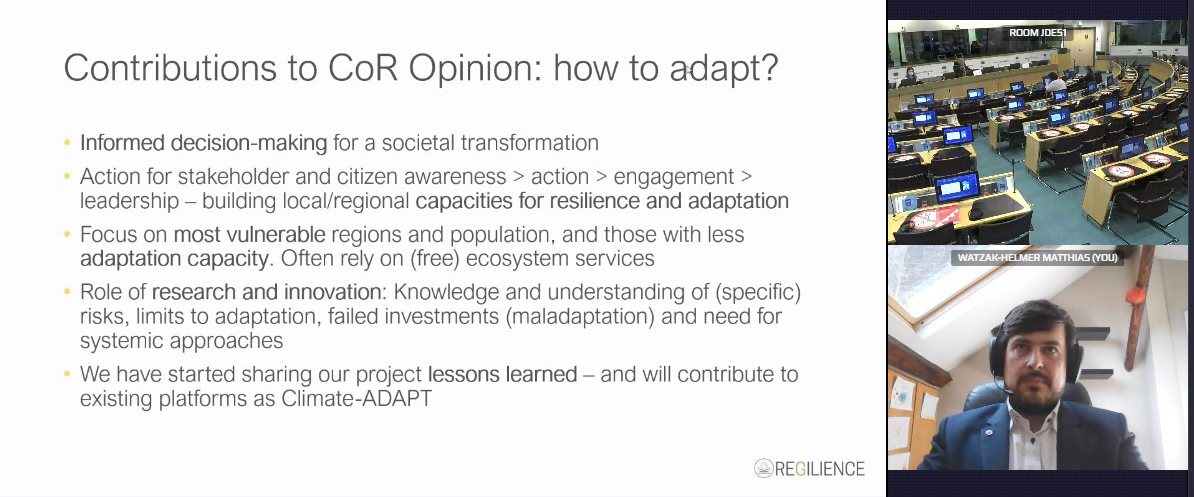On the 22nd of March 2022, REGILIENCE contributed to the Hybrid Stakeholder consultation on Ecological transition – Which balance between social acceptability and environmental imperatives to build resilient communities from the point of view of cities and regions?

Climate risks are context related and climate action calls for tailored solutions. Local and regional authorities know best the local and regional challenges therefore they should be equipped with the instruments to pursue the solutions that best fit the local scenario. A resilient community is able to resist, absorb and recover from the effects of climate risks and other disruptions. Achieving resilience means more than just mitigating negative effects, it means developing an atmosphere where both society and economy can prosper.
The Committee of Regions (CoR) Rapporteur, Hanna ZDANOWSKA (PL/EPP), Mayor of Łódź and member of the Commission for the Environment, Climate change and Energy (ENVE) prepares a position on Ecological transition and strives for the highest possible quality input and widest range of different views for her opinion. REGILIENCE as frontrunner project of the EU Mission “A climate-resilient Europe” was invited to share the opinion and first conclusions of REGILIENCE and its sister projects – ARSINOE, IMPETUS and TransformAr from working with 22 different European regions.
REGILIENCE’s contributions to the Stakeholder consultation
During the stakeholder consultation session, Matthias Watzak-Helmer, REGILIENCE project manager and FEDARENE representative, shared the opinion of the four frontrunner projects of the EU Mission “A climate-resilient Europe”. He outlined the need to act now by mentioning exemplary hard limits to adaptation, the importance of intact ecosystems and biodiversity to buffer climate change impacts as well as the high level of support by European society for climate change actions. Social acceptance will grow if the necessity for the actions and the impact of non-action is explained.
REGILIENCE and its sister projects shared four key messages on how to adapt:
- Climate adaptation requires informed decision-making and informed citizens to support the societal transformation!
- Climate adaptation support must focus on most vulnerable regions and population as well as on those with less adaptation capacities! The most vulnerable regions often rely on (free) ecosystem services in their daily activities!
- The knowledge of research about innovation and the understanding of (specific) risks especially on the limits of adaptation, failed investments (maladaptation) and the need for systematic approaches must be shared and transferred to the regions!
- Local and regional capacities for resilience and adaptation need to be built up supported by actions for stakeholders to create awareness, lead to action, increase engagement and conclude in local and regional leadership!
About REGILIENCE
REGILIENCE will support communities and regions across Europe according to the addressed key messages on the way towards climate resilience by increasing local and regional capacities. Around 700 actions for all European regions will communicate on knowledge tools on financing, citizen resilience scan, adaptation and much more. Close cooperation with 10 vulnerable and low-capacity regions will support their way towards climate resilience. Spreading the word and sharing the most promising solutions will inspire policymakers, organisations and individuals to become part of the change.